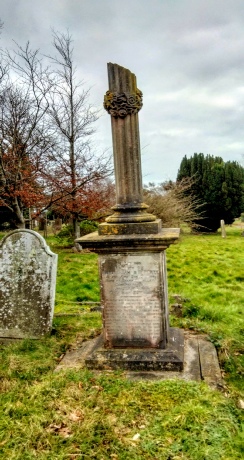Friends of Hastings Cemetery

BB I02 -
In Loving
Memory of
Samuel James Bennett
Of the Firs, Staplecross
Born at Shepton Mallett
Somersetshire
April 30th 1832
Died May 23rd 1881
‘A loving husband, a fond
Father, a devoted son. An
affectionate brother. An
unfailing friend. Earnest and
decisive in business. Endowed with rare
abilities. Early consecrated to the Master’s
use. To the inexpressible grief of those that
survive him he was suddenly in the noon of
his life summoned to the nearer and holier
service of the church above.’
Hastings and St Leonards Observer -
May 23rd, at his residence, The Firs, Staplecross, Samuel James Bennett, Esq. formerly of 51, M00rgate-
Hastings and St Leonards Observer -
DEATH OF MR. SAMUEL JAMES BENNETT. The remains of Mr. Samuel James Bennett well known in local Nonconformist circles, were interred a few days ago in the beautiful cemetery at Ore, his last resting place being on the right of the central path beyond the chapel.
The following are some extracts of article son the deceased which appeared in the Commercial Gazette, of which , he was the proprietor : "It is with feelings of the most profound sorrow, that will be fully shared by our readers, we have to record death the original founder and proprietor of this Journal, which took place at his residence, The Firs, Staplecross, Sussex, on Monday, the ult. Mr. Bennett was in town on the previous Wednesday and Thursday, and complained of an attack of sciatica. On returning home his illness increased, and on the Saturday his medical attendant. Dr. Harris, of Northiam, was called, who pronounced his patient to be suffering from acute rheumatism, which might possibly end in rheumatic fever. Mr. Bennett's condition improved on Sunday, but on the afternoon Monday Dr. Harris saw him, with Dr. Collins, of Beckley, and the symptoms appeared to have alarmingly developed in a complicated condition of the lungs and heart.
Dr. Shaw, Hastings, and Dr. Stephen Yeldham, of London, were immediately summoned by telegram, but before they could reach Staplecross, Mr. Bennett had peacefully passed away, at a few minutes past nine o'clock.
"Mr. Samuel James Bennett was born at Shepton Mallett, on the 30th April 1832, and entered upon business pursuits at an unusually early period, and at the age of twenty resolved upon commencing business at Manchester. Some little time was spent in a study of Manchester men and their modes of doing business, and the failure at this time of the Commercial Credit Assurance Company, originally established on the Utopian principle of guaranteeing the payment of bad debts by a fixed premium applied to all trades under two or three classes, led Mr. Bennett to examine the question.
He found that a system already successfully worked in America could be adapted to the needs and requirements of the manufacturers and merchants of this country. The most pressing appeared to be a more ready and facile mode of obtaining information of the standing of unknown persons seeking to do business with them ; of a readier and more inexpensive method of obtaining and recovering the payment of overdue debts, and this he proposed should be met by a combination of wholesale traders of all businesses, who, by payment of a fixed annual subscription to his firm should have such work undertaken.
This combination would, he believed, lead to the ultimate extinction of 'long firms,' secure unanimous co-
I
n 1859, Mr. Bennett, having opened branches in Liverpool and Dublin, resolved to transfer his headquarters to London, though against the advice of many of the leading Manchester houses who supported him. So widely had he become known in that district that his removal to London was felt by them as a positive loss, and so expressed. ... . After seven years of most anxious and laborious work he retired to Sussex, and occupied the leisure not spent in town in pastoral ana literary pursuits. '. . . . He had, in the discharge of claims, travelled most extensively in these kingdoms, his constant weekly duties covering "perhaps five hundred to a thousand miles and attending five or six important meetings of creditors, and this too when railway and telegraphic communications had not reached the completeness of to-
He travelled extensively, from The Pyrenees, Oberammergau, to Lebanon and Damascus. Information thus acquired was effectively used in admirable lectures, delivered freely in aid of any worthy undertaking…… ' This noble work was only ended by death. His last effort was at Northiam, aid of the restoration of Sedlescombe ... In politics, he was a decided member of the national party, and the dignity and integrity of the Empire, the maintenance its prestige abroad, and the gradual development of its strength by judicious reforms at home, he considered of far more importance than merely the factious claims of party. . …
A genial disposition wedded to frank and open candour, a strict integrity linked with a manliness that refused be allied with anything that could not stand the fiercer light of criticism, combined to endear him to those who knew him best. A wise counsellor, a judicious adviser, a firm and lasting friend, on whose like we shall not look again "until the day breaks and the shadows flee away."
Mr. Bennett leaves a widow and three daughters to mourn their irreparable loss.
